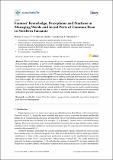| dc.description.abstract | Weeds and insect pests are among the serious constraints in common bean production
in most rural communities. A survey of 169 smallholder farmers was conducted in two common
bean-growing districts in northern Tanzania. The aim was to assess farmers’ knowledge, perceptions,
current management practices and challenges in order to develop sustainable weed and insect pest
management strategies. The results revealed that 83% of farmers perceived insect pests as the major
constraint in common bean production, while 73% reported weeds as the main drawback. Insect pest
managementwasmainly achieved through the use of synthetic pesticides, however, only 24%of farmers
were able to apply, the rest could not afford due to high cost, limited access and lack of knowledge.
Only 6.5% of farmers were aware of non-chemical methods and 2.1% did not practice any method in
managing insect pests, both in the field and during storage. Moreover, farmers generally relied on
experience inmanaging insect pests andweeds, and about 43%did not see the need to consult extension
officers. These findings indicate that there is a need to sensitize and train farmers on the sustainable
methods for pest and weed management in common bean farming systems in northern Tanzania. | en_US |

